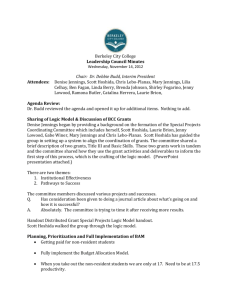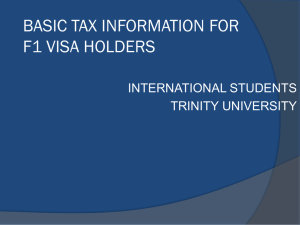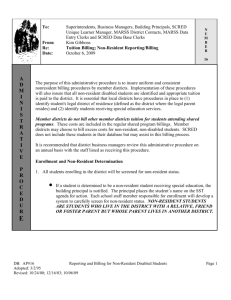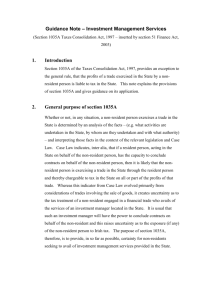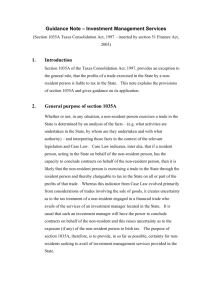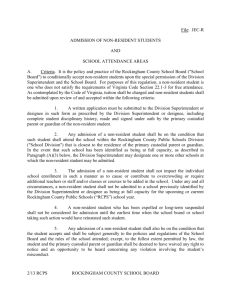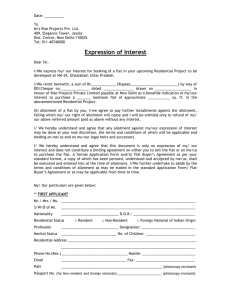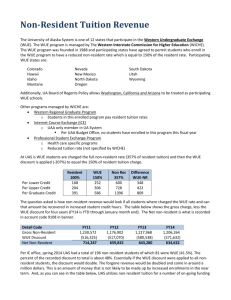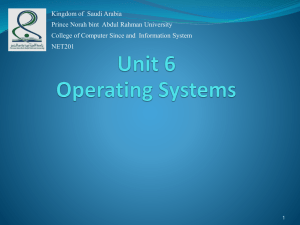Library Law: A Primer on Non-Resident Card Programs
advertisement
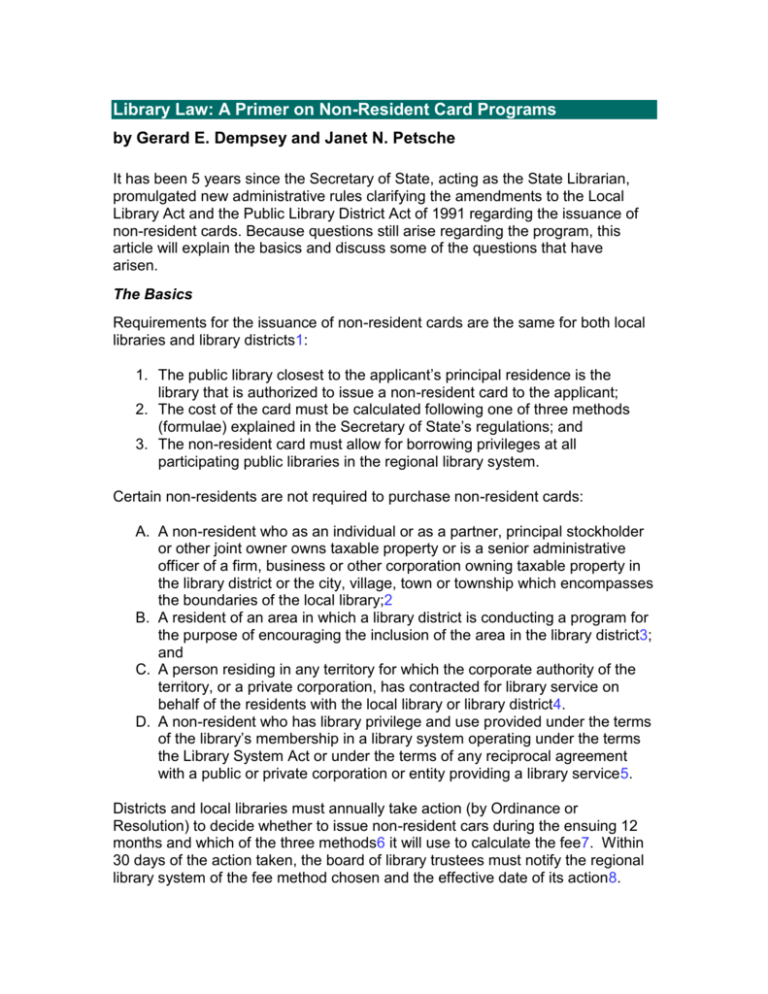
Library Law: A Primer on Non-Resident Card Programs by Gerard E. Dempsey and Janet N. Petsche It has been 5 years since the Secretary of State, acting as the State Librarian, promulgated new administrative rules clarifying the amendments to the Local Library Act and the Public Library District Act of 1991 regarding the issuance of non-resident cards. Because questions still arise regarding the program, this article will explain the basics and discuss some of the questions that have arisen. The Basics Requirements for the issuance of non-resident cards are the same for both local libraries and library districts1: 1. The public library closest to the applicant’s principal residence is the library that is authorized to issue a non-resident card to the applicant; 2. The cost of the card must be calculated following one of three methods (formulae) explained in the Secretary of State’s regulations; and 3. The non-resident card must allow for borrowing privileges at all participating public libraries in the regional library system. Certain non-residents are not required to purchase non-resident cards: A. A non-resident who as an individual or as a partner, principal stockholder or other joint owner owns taxable property or is a senior administrative officer of a firm, business or other corporation owning taxable property in the library district or the city, village, town or township which encompasses the boundaries of the local library;2 B. A resident of an area in which a library district is conducting a program for the purpose of encouraging the inclusion of the area in the library district3; and C. A person residing in any territory for which the corporate authority of the territory, or a private corporation, has contracted for library service on behalf of the residents with the local library or library district4. D. A non-resident who has library privilege and use provided under the terms of the library’s membership in a library system operating under the terms the Library System Act or under the terms of any reciprocal agreement with a public or private corporation or entity providing a library service5. Districts and local libraries must annually take action (by Ordinance or Resolution) to decide whether to issue non-resident cars during the ensuing 12 months and which of the three methods6 it will use to calculate the fee7. Within 30 days of the action taken, the board of library trustees must notify the regional library system of the fee method chosen and the effective date of its action8. Existing non-resident cards must be honored for a full 12 months from the date of purchase.9 Determining the appropriate non-resident service areas must be accomplished in cooperation with other participating libraries and the regional library system and adjacent regional library systems.10 The library or district must keep available for public inspection its non-resident service policy including a description of the library’s service areas and the method of calculating the fee11. Non-resident applicants for library cards should be advised to use the school district in which the non-resident has his/her principal residence to determine the closest public library unless due to the commonality of community interests, library services at another library that is physically closer may better serve the non-resident’s needs. 12 No local library or library district is required by any of these regulations to participate in the non-resident library card reciprocal borrowing program of a regional library system13; however, no library may issue “local-use only” nonresident cards even if it is not participating in the non-resident library card program.14 Implementation Questions The State Library’s former Deputy Director Mike Ragen, who retired from his position in January, 2007, fielded many questions both before and after the July 1, 2002 effective date of the amendments and the rules. The following are some of the questions that were answered from the point-of view of the State Library and that can be found on the State Library’s web site www.cyberdriveillinois.com/departments/library by entering “non-resident cards” in the search box and hitting on the dates of the listed Memos issued by Ragen. For your convenience we have included the short answers Mr. Ragen supplied: 1. May I issue multi-year non-resident cards? NO 2. Can local-use only non-resident cards be issued? NO 3. Can non-participating libraries not honor the non-resident card of another library? YES 4. Is a non-business renter entitled to the same treatment as a residential renter? YES 5. Do I have to refund a non-resident cardholder’s money if he/she moves out of my service area? NO 6. Can non-residents be charged a fee higher than that charged residents for special programs or services? NO 7. Can a library provide free cards to non-resident staff? YES 8. Does non-participation in the non-resident card program affect the receipt of State Library grants? NO Some questions that have arisen involving more complicated issues have occasioned disagreement among library law attorneys, some of whom have disagreed with some of the State Library’s interpretations. Although the State Library’s web site can be helpful, library administrators may wish to contact a qualified library law attorney if they have non-resident card questions. Gerard Dempsey and Janet Petsche are partners with the law firm of Klein, Thorpe & Jenkins, Ltd. which is an Illinois law firm with offices in the Civic Opera Building at 20 North Wacker Drive in Chicago and at 15010 S. Ravinia, Orland Park. The firm concentrates in the representation of local libraries, library districts and library systems, as well as other local governmental units 1 75 ILCS 5/4-7 (12); 75 ILCS 16/30-55.60. 2 Id. 3 75 ILCS 16/30-55.60 (2) 4 23 Ill.Adm.Code 3050.80. 5 75 ILCS 5/4-7 (12); 75 ILCS 16/30-55.60. 6 23 Ill.Adm.Code 3050.60. 7 23 Ill.Adm.Code 3050.20 (a) 8 23 Ill.Adm.Code 3050.20 (b) 9 23 Ill.Adm.Code 3050.20 (c) 10 23 Ill.Adm.Code 3050.20 (d) 11 23 Ill.Adm.Code 3050.40(a) 12 23 ILCS 3050.25 (a) 13 23 ILCS 3050.20 (e) 14 23 ILCS 3050.50 (b) Originally Published May 16 , 2007 in vol. 1, iss. 9 of the Metropolitan Library System Newsletter [View]

